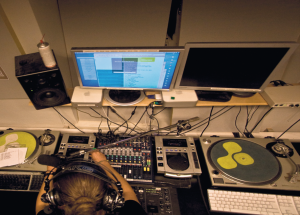WEDNESDAY, 3 OCTOBER 2012
The first BlueSci talk I attended sticks out in my mind for two reasons. One reason is that I got to meet Brian Leith, the executive producer of Human Planet, and hear some of the amazing stories behind the footage and people that were featured on the programme which made it such a success. The second is that after meeting the BlueSci President for the first time, to my complete surprise, he agreed to let me have my own radio show.At the time I hadn’t even finished my radio training at CamFM, so I had no idea how I was going to gather enough material to even fill one hour, let alone create anything that people would actually want to listen to. But, as with most things, I was thrown in at the deep end, and before I even had a single show under my belt I was faced with the prospect of interviewing Dr Stuart Clark, Fellow of the Royal Astronomical Society and now the author of a series of historical fiction novels about the lives of scientists such as Newton and Galileo. Although I was nervous at first, by the end it was hard to stop the torrent of questions that kept popping into my head, and a free copy of a book is always nice.
Since then, we’ve done ten shows and three special features on all manner of fascinating science, from synaesthesia to using video games in nature conservation. I have had the privilege to talk to people from all sides of the scientific community, work with some wonderful co-hosts and learn even more about what I find most interesting in the world. One of the highlights of the year was the talk I had with Dr Helen Scales, a marine biologist and diving explorer, about the secret lives of seahorses and the mysteries of the deep. When I look back on all we’ve done this past year, from attending seminars to interviews and competitions, I can’t believe how much fun it’s all been. The BlueSci Radio Show has genuinely been one of the most rewarding things that has happened to me at University, and if science communication is something that you’ve thought about pursuing then I can’t recommend radio as a platform for it more highly.
The thing about radio is that it’s so much more personal than television. Staring at a camera to present a television show now seems so artificial compared to talking into a mic, and I think radio achieves a much more natural feel to its output than TV or the written word. Towards the end of last year, nearly all of the shows were broadcast live, and when you don’t have a script in front of you the only choice is to adopt an almost conversational tone with your co-host - and the listeners too. That, at least, is what I hoped people would think when they listened to one of our shows; that it wasn’t a lecture or presentation about science, but an animated chat that they could be a part of.
This year, the show will be bigger and even better than before. If you haven’t listened to any of our past programmes then do download our podcasts from the BlueSci website. If you would like to get involved in any aspect of the show, from research to presenting to producing, than please don’t hesitate to get in touch - no matter how much you hate the sound of your own voice.
Anand Jagatia is a 3rd year Undergraduatate studying Neuroscience. He has been the presenter and editor of the BlueSci radio show since October 2011.
BlueSci Radio is broadcast live on CamFM, Tuesdays 16:00-17:00. Tune in to 97.2 FM, or log on to
www.camfm.co.uk to listen online. Join us to hear about our feature of the week, get the latest science news and reviews and keep up to date with science events happening in Cambridge. Previous episodes of the show are available to download from bluesci.org. If you have a science question you want answered live on air or if you would like to get involved with radio production email the radio editor and BlueSci radio show host Anand Jagatia at radio@bluesci.co.uk.

